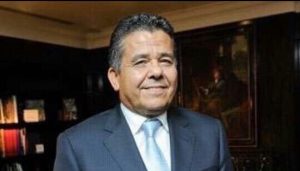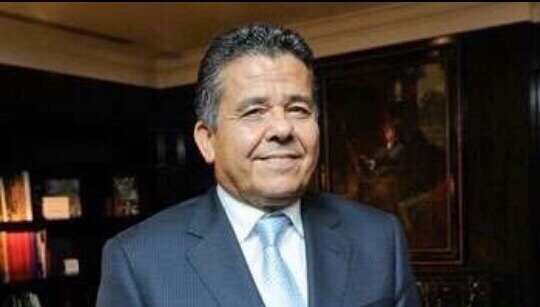By Michel Cousins.

Tunis, 1 December 2016:
With Libya in political stalemate, the refusal of many in the international community to have any contact with the interim government in Beida has added to problems, not helped solve them says its foreign minister, Mohamed Dayri.
In a wide-ranging interview with the Libya Herald, his first after being reinstated as minister after a six-month suspension, Dayri took to task the UN and a number of normally friendly countries for their decision to have nothing to do with his government and instead recognise the Presidency Council’s “Government of National Accord” (GNA).
Libya was in crisis, he said. It therefore made political sense to be in contact with the interim government led by Abdullah Al-Thinni even though there was a UN resolution recognising not just the Presidency Council but also its GNA. It, he pointed out, had no legitimacy in Libya because it had not been approved by the democratically-elected House of Representatives.
“Irrespective of the legitimacy issue, in view of the prevailing situation, the very painful situation that Libya has seen itself in, I would have expected that some Arab nations and some parties in Europe and elsewhere would reach out to us because we are part of the political spectrum that everybody has to deal with,” he said.
“The situation warrants that we should have been included in some of the very substantive discussions that have prevailed.”
There were not even backchannels of communication, he revealed.
“The situation is so bad that Arab, European and other countries in the world should be in contact with us. Backchannels should be present. But they’re not there, to our great dismay.”
Yet, he pointed out, when the so-called government of national salvation had been in power in Tripoli after Abdullah Thinni’s legitimate, internationally-recognised government was forced out by Libya Dawn and had to go to Beida, backchannels had been operating.
“We know that many Arab countries and others kept some backdoor channels with the then ‘Salvation government’. So we would have expected that the international community would reach out to us. It ought to do so because we are part of a political side that can contribute to a solution.”
In any event, Dayri indicated hypocrisy in the international community’s stance towards his government. In Yemen, the UN mediator was working with both parties to the conflict, the government and those who used arms to try and force their way to power. “But at least there are two sides involved.
In Libya too there had been two sides: “a side that took to arms and challenged a legitimate legislature and government that had been internationally recognised.”
But in Libya, Dayri points out, the international community then rejected the government chosen by the democratically-elected legislature and included instead individuals who had no real support.
“The Libyan process has seen many participants in the Dialogue Committee who have no influence whatsoever on the ground.”
The international community had, moreover, contributed to the crisis by forcing on the country a government, the GNA, which did not have a vote of confidence from the HoR and as such lacked legitimacy.
“It is something that many Libyans on our side have not been satisfied with, starting with myself.” The GNA, he said, “is perceived with negative implications, a western imposition”. This translated into a resentment of the west.
Adding to that resentment, he noted, was the view that some in the international community have been trying to impose political Islam on Libya.
There is, he said, “a well-grounded belief that the international community has taken sides and puts too much emphasis on the family of political Islam in Libya”.
The aim of some western nations had been to separate the moderate Islamists from the radical ones.
“We don’t see dividends from that approach, not least because terrorism has been rife and growing in Libya”. Moreover, the Islamists had been overwhelmingly defeated in both general elections held in Libya since the revolution, that for the General National Congress in 2012 and for the House of Representatives on 2014.
Some of the so-called moderates, he said, actually have supported terrorists financially and provided them with weapons. “Some are linked to ISIS and some to AQIM [Al-Qaeda in the Islamic Maghreb] which has been open in its support to some terrorist groups in Libya.”
It was time for many in international community – “and we’re not talking only about the US and the UK which some of my compatriots tend to confine the international community to” – to redress the situation and heed the aspirations of the Libyan people who, he said, wanted security and political stability. These would come from a national army, a police force, security agencies and a functioning and independent judiciary.
“If the international community does not seek to address these legitimate grievances, there will be no option but to seek help from the Arab League and African Union.”
Neither, he noted, had been involved in the negotiations that resulted in the Libyan Political Agreement. “The active participation of the AU and the Arab League would be likely to bring greater credibility to the political process which could lead to a government of national unity.”
In any event, he pointed out, the UN had accepted a tripartite coordination at its meeting in Cairo on 25 October with the Arab League and the African Union (AU).
Not just the Arab League and AU, but regional players, including Saudi Arabia, as well.
“It is of importance that we get Saudi Arabia or the UAE on board as the spearhead of an Arab League effort.”
It was also crucial that the international community reached out to some key regional powers – Egypt, the UAE, Saudi Arabia, Qatar and Turkey – to help in the process.
“I see some relevance in the French government approach which called a meeting on Libya on 3 October in Paris and which aimed at bringing some regional and international stakeholders around the same table.”
But the Saudis would not want to be seen imposing themselves on peace-making in Libya.
“The Saudis have rightly been stressing that Libyans and others agree to their involvement. They also want consensus among the regional powers.”
The wider international community, though, had to take a genuinely impartial stand.
“From the position I’ve been in, I’ve observed that there has been a keen interest in tackling the issue of Libya on the part of some western nations by putting pressure only on Egypt and the UAE.”
The other potential way forward, Dayri notes, is a new government.
“All sides, including our government and Prime Minister Thinni, have talked about the need to bring about a national government – a single government – and end this political divide that has translated into two, and now three, governments in Libya.”
One area where he does agree with the Presidency Council is that of the over-bloated Libyan diplomatic service.
Just over a month ago, the head of the PC, Faiez Serraj, issued a directive on embassy staffing which would result in a considerable reduction in numbers.
“The move has been the right one since Zeidan’s time. We have to cut the number of diplomats abroad,” Dayri said. But the PC was simply following in the Beida government’s footsteps, he said. He himself had already proposed cuts.
“Once diplomatic stability is back to Libya we’ll have to tackle diplomatic overstaffing. It’s of concern to all Libyans.”
But, he added, there was stiff resistance to what was a sorely needed move. “It’s still out there. We have the petty interests of some groups.”
It is an issue that has already caused him personal difficulties.
Even among states that stopped recognising the interim government, Dayri is widely respected and there was dismay, even incomprehension, when earlier this year he was suspended from office. It was the second time. He was suspended in September 2015 just after a successful visit to China. That suspension lasted two months. The more recent ended just three weeks ago.
It had been very frustrating, he said. Libyan public opinion, he believed, had also been frustrated with what had been unlawful and unnecessary moves and which had impacted negatively on the credibility of the ruling political players.
In both cases, he says, it was the result of nepotism and self-interest clashing with his refusal to appoint individuals related to members of the HoR or the government as top diplomats abroad. In the second case, “there was a fallacy put forward that I allowed the GNA to get a seat at the Arab League at the end of May”. Indeed, he stressed, he had taken part in the Arab League ministerial meeting with China in Doha in mid-May, having been invited to do so.
“I have been appalled by small groups in the political spectrum which succeeded in suspending me twice not because of the conduct of foreign policy or shortcomings in it but because of personal interests.
“I have been disenchanted by nepotism and the favouritism of some of the ruling political elite in the HoR or connected to the government.”
Those in positions of power and influence had to understand that Libya, “mired in chaos, with its riven politics, bankrupt economy, and the increased challenges posed by terrorism, requires that we stop this nonsense and we give precedence to the national interests so that we get ourselves out of the hole we’re currently in”.
He added: “We have to be above this. Libya is in deep trouble. We need to put national interests above self-interests.”








